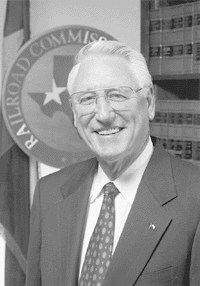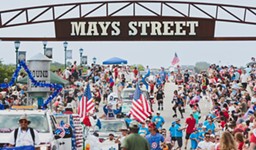Matthews, My Man
Fri., May 22, 1998
 It's easy to be cynical about politicians. It's even easier to write nasty things about them. But every once in a while you meet a good one, a politician who isn't interested in getting rich, who strives to do the right thing, and who speaks out on important issues that no one else seems to care about. I never thought I'd be saying this about a Republican, particularly one running the Texas Railroad Commission. But I have to admit it: I like Charles Matthews. There are a number of reasons. First and foremost, he unseated Jim Nugent, one of the most arrogant politicians ever to hold office in Texas. Nugent outspent Matthews 8-1. Matthews beat him anyway.
It's easy to be cynical about politicians. It's even easier to write nasty things about them. But every once in a while you meet a good one, a politician who isn't interested in getting rich, who strives to do the right thing, and who speaks out on important issues that no one else seems to care about. I never thought I'd be saying this about a Republican, particularly one running the Texas Railroad Commission. But I have to admit it: I like Charles Matthews. There are a number of reasons. First and foremost, he unseated Jim Nugent, one of the most arrogant politicians ever to hold office in Texas. Nugent outspent Matthews 8-1. Matthews beat him anyway.
I'm writing about Matthews now because while others, including his fellow Republicans, have been reluctant to speak out about the mess at Union Pacific, Matthews has been beating the drum long and loud. He's held public hearings. He's been to Washington several times to ask the Surface Transportation Board, the federal agency that regulates the nation's railroads, to force UP to sell some of its tracks in Texas. He's done countless interviews with the press. On the day I interviewed him a few weeks ago, he had talked himself hoarse complaining about UP.
Matthews, 59, the former mayor of Garland, is a dyed-in-the-wool Republican. But when he talks about railroads, he sounds like a populist Democrat. "The railroads believe in monopolies," says Matthews. "They say the only way we can invest the money in the infrastructure and make the system work is if we have all the business. You take their logic to its full conclusion, it means there should only be one railroad in the country," he says. "Of course, every bone in my body tells me that's the wrong thing."
Told he sounds more like a Democratic member of The Grange than a starched, white-shirt Repub-lican, Matthews protests. "The idea of competition is something that anybody who has been a Republican always looks at. I always thought the Democrats believed in monopolies. You go back to Teddy Roosevelt, one of the absolute great Republicans, he busted up all the monopolies that were supported by all the Democrats."
Matthews says that the deregulation of the railroad industry, which began in 1980 when Congress passed the Staggers Act, is to blame for many of the problems now facing rail transport in Texas. When the act was passed, he says, "we had 100 large railroads in the United States. Today, we have 10. The free enterprise system is not working." And Matthews puts the blame for the UP problem squarely on the Surface Transportation Board, which allowed UP to take over Southern Pacific in 1996. That merger made UP the nation's largest railroad, with 36,000 miles of track. One-sixth of that is in Texas, and nearly a third of all UP's freight goes through the Lone Star State.
But the merger caused huge problems. Late last year, a study commissioned by the Railroad Commission estimated that Texas businesses have lost over $1 billion due to the UP mess, and losses continue to mount at a rate of $100 million per month. "The bureaucrats in Washington are not up to the job of regulating these major industries," says Matthews. "The result is that Texas companies and Texas consumers are being hurt in the process."
Some of the biggest ranches in the state, including the King Ranch, Kenedy Ranch, and Goodnight Ranch, were built, all or in part, by lands granted to their owners for building railroads. S.G. Reed, the author of several books and articles on the history of railroads in Texas, pointed out in an April 1946 article published in the Southwestern Historical Quarterly that the state gave away more than 32 million acres of land to encourage entrepreneurs to build railroads. In 1854, for each mile of railroad built, a company was allowed to receive 10,240 acres of unappropriated state land. The state encouraged the construction of the railroads in order to foster commerce, and as a way to help rural residents get their products to market.
But with the land grants came an understood reciprocal agreement: The railroads were to be common carriers, available to everyone. The railroads were not allowed to discriminate, and they had to provide reliable service at a reasonable cost. Matthews believes that agreement has been forgotten amidst the merger mania that has taken place over the past few years. And now, he says, the federal government should forget about harassing Microsoft and pay some attention where it is needed: the railroads.
Matthews also admits that his experiences with the UP crisis have led him to change his thinking about the role of government. "If you were a conservative, you always believed in deregulation. But what we are beginning to see is that deregulation is not the great panacea we thought it was," he says. "What's occurring in deregulation is that if there are no controls put in there, there's going to be this consolidation where you have so much economic power concentrated in a few hands. And this railroad thing is a perfect example. It's probably the best example." -- R.B.
Got something to say on the subject? Send a letter to the editor.






